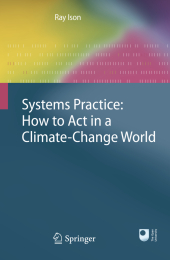 Neuerscheinungen 2010Stand: 2020-01-07 |
Schnellsuche
ISBN/Stichwort/Autor
|
Herderstraße 10
10625 Berlin
Tel.: 030 315 714 16
Fax 030 315 714 14
info@buchspektrum.de |

Ray Ison
Systems Practice: How to Act in a Climate Change World
2010. 2010. xvi, 340 S. 122 SW-Abb., 10 Tabellen. 235 mm
Verlag/Jahr: SPRINGER, BERLIN 2010
ISBN: 1-84996-124-7 (1849961247)
Neue ISBN: 978-1-84996-124-0 (9781849961240)
Preis und Lieferzeit: Bitte klicken
It is now accepted that humans are changing the climate of the Earth and this is the most compelling amongst a long litany of reasons as to why, collectively, we have to change our ways of thinking and acting. Most people now recognise that we have to be capable of adapting quickly as new and uncertain circumstances emerge: this capability will need to exist at personal, group, community, regional, national and international levels, all at the same time.
Systems Practice is structured into four parts. Part I introduces the societal need to move towards a more systemic and adaptive governance against the backdrop of human-induced climate change. Part II unpacks what is involved in systems practice by means of a juggler metaphor; examining situations where systems thinking offers useful understanding and opportunities for change. Part III identifies the main factors that constrain the uptake of systems practice and makes the case for innovation in practice by means of systemic inquiry, systemic action research and systemic intervention. The book concludes with Part IV, which critically examines how systems practice is, or might be, utilised at different levels from the personal to the societal.
The development of our capabilities to think and act systemically is an urgent priority and Systems Practice aims to show how to do systems thinking and translate that thinking into praxis (theory informed practical action) which will be welcomed by those managing in situations of complexity and uncertainty across all domains of professional and personal concern.
Part I Thinking and Acting Differently.- 1. Introduction and Rationale.- Part II Systems Practice as Juggling.- 2. Introducing Systems Practice.- 3. Making Choices About Situations and Systems.- 4. The Juggler - A Way to Understand Systems Practice.- 5. Juggling the B-ball - Being a Systems Practitioner.- 6. Juggling the E-ball - Engaging with Situations.- 7. Juggling the C-ball - Contextualizing Systems Approaches.- 8. Juggling the M-ball - Managing Overall Performance in a Situation.- Part III Systemic Practices.- 9. Four Settings that Constrain Systems Practice.- 10. Systemic Inquiry.- 11. Systemic Action Research.- 12. Systemic Intervention.- Part IV Valuing Systems Practice in a Climate-change World.- 13. Valuing Systems Practice.- Index
Dr. Lauren A. Rickards , Melbourne Sustainable Society Institute, The University of Melbourne, Australia
In: Journal of Environmental Policy & Planning, Volume 14, Issue 4, 2012, pp.481-483
As the ´wicked´ and ´messy´ nature of contemporary problems becomes increasingly apparent, the need to better understand and appropriately engage with the complex systems we are part of is of growing importance. Systems Practice: How to Act in a Climate Change World is rich in insight into the challenges and joys of developing this was of thinking and acting. It is itself a highly valuable but challenging book, in part because of the depth of the problems in modern society it reveals (including, for example, the very concept of ´problems´, with its implicit simplistic corollary: ´solutions´). It is also challenging because of the richness of strategies it provides for engaging with these ´problems´ and becoming a ´systems practitioner´... Its breadth and depth of thinking is stimulating and the intellectual and emotional challenges it poses reflect the situations we are in rather than weaknesses with the book itself, which is instead carefully and cleverly crafted.


